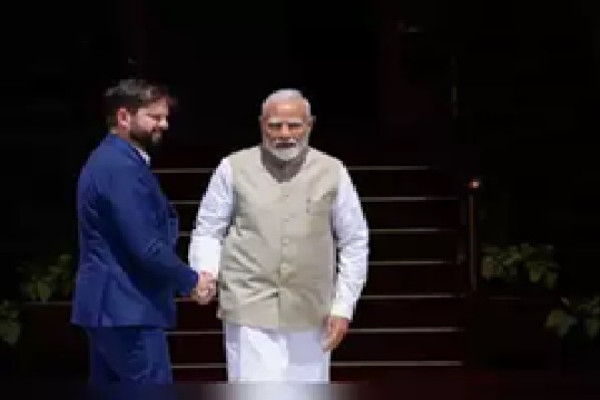India and Chile have cleared the decks to begin negotiations on a Comprehensive Economic Partnership Agreement (CEPA). That was the major outcome after Chile’s visiting President Gabriel Boric held talks with Prime Minister Modi on Tuesday.
Senior diplomat Periyasamy Kumaran confirmed at a special media briefing that “Currently, talks are underway to convert our partial trade agreement into an FTA, and we have agreed to explore the direction of a CEPA.”
The joint statement issued issued at the end of the talks incorporated President Boric’s commitment “to grant multiple entry permit for Indian businesspersons which will streamline the visa process”. India has already put in place “a flexible visa regime .. by extending e-visa facility for Chilean travellers”.
Through CEPA Chile hopes to export more agricultural goods to India, it is also keen to expand its industrial capabilities and draw more Indian investment. So ports and infrastructure, and renewable energy are areas where President Boric is inviting India to invest.
Minerals Sector
A key area of collaboration highlighted during the talks was the critical minerals sector. As one of the world’s largest producers of copper and lithium, Chile holds substantial importance for India, which relies on these minerals for its rapidly expanding industrial sector.
As Kumaran noted “Chile produces 24% of the world’s copper output, and 30% of the world’s lithium comes from Chile.”
Lithium is essential for the production of batteries for electric vehicles (EVs) and other emerging technologies. The two countries are discussing ways to collaborate more closely in this sector, including potential Indian investments in mining and value addition within Chile before the minerals are exported.
Chile’s mining sector contributes around 13% to the nation’s GDP, underscoring its significance. Both countries have signed an MoU to explore further collaboration in the critical mineral sector, which will be an integral part of the ongoing CEPA discussions.
Technology And Defence
Talks also covered defence cooperation with Modi underlining the growing collaboration in this sector. There are plans to develop defence industrial manufacturing and secure supply chains to meet each other’s needs.
They will also enhance cooperation in tackling common challenges such as organized crime, drug trafficking, and terrorism.
Technology cooperation emerged as a major focal point. Both nations are keen on expanding collaboration in sectors such as digital infrastructure, space exploration, and renewable energy.
Cooperation In Antarctica
Chile, which considers itself a critical gateway to Antarctica, has invited India to expand its activities in the region. Both countries signed a cooperation agreement that will focus on scientific research and exploration in Antarctica, as well as the conservation of marine living resources in the Southern Ocean.
As both India and Chile are Consultative Parties to the Antarctic Treaty, they reaffirmed their commitment to deepening their scientific understanding of the continent and collaborating on relevant research.
In his remarks President Boric specifically stressed the importance of Antarctica in Chile’s foreign policy, and the potential for greater collaboration with India in this field.
Shoot In Chile
Prime Minister Modi noted that both sides are committed to simplifying the visa process and increasing student exchanges between the two countries. Furthermore, President Boric highlighted the growing interest in strengthening the cultural ties between India and Chile, including promoting the audiovisual industry through initiatives such as the ‘Shoot in Chile’ program.





